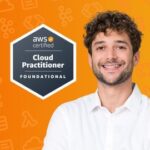
Mathematics for Data Science and Machine Learning using R
Mathematics for Data Science and Machine Learning using R, available at $54.99, has an average rating of 4.3, with 65 lectures, based on 119 reviews, and has 950 subscribers.
You will learn about Master the fundamental mathematical concepts required for Datas Science and Machine Learning Learn to implement mathematical concepts using R Master Linear alzebra, Calculus and Vector calculus from ground up Master R programming langauge This course is ideal for individuals who are Anyone who wants to learn Data Science , AI or Machine learning will find this course very useful It is particularly useful for Anyone who wants to learn Data Science , AI or Machine learning will find this course very useful.
Enroll now: Mathematics for Data Science and Machine Learning using R
Summary
Title: Mathematics for Data Science and Machine Learning using R
Price: $54.99
Average Rating: 4.3
Number of Lectures: 65
Number of Published Lectures: 65
Number of Curriculum Items: 65
Number of Published Curriculum Objects: 65
Original Price: $29.99
Quality Status: approved
Status: Live
What You Will Learn
- Master the fundamental mathematical concepts required for Datas Science and Machine Learning
- Learn to implement mathematical concepts using R
- Master Linear alzebra, Calculus and Vector calculus from ground up
- Master R programming langauge
Who Should Attend
- Anyone who wants to learn Data Science , AI or Machine learning will find this course very useful
Target Audiences
- Anyone who wants to learn Data Science , AI or Machine learning will find this course very useful
With the increase of data by each passing day, Data Science has become one of the most important aspects in most of the fields. From healthcare to business, everywhere data is important. However, it revolves around 3 major aspects i.e. data, foundational concepts and programming languages for interpreting the data. This course teaches you everything about all the foundational mathematics for Data Science using R programming language, a language developed specifically for performing statistics, data analytics and graphical modules in a better way.
Why Learn Foundational mathematical Concepts for Data Science Using R?
Data Science has become an interdisciplinary field which deals with processes and systems used for extracting knowledge or making predictions from large amounts of data. Today, it has become an integral part of numerous fields resulting in the high demand of professionals of data science. From helping brands to understand their customers, solving complex IT problems, to its usability in almost every other field makes it very important for the functioning and growth of any organizations or companies. Depending upon the location the average salary of data scientist expert can be over $120,000. This course will help you learn the concepts the correct way.
Why You Should Take This Online Tutorial?
Despite the availability of several tutorials on data science, it is one of the online guides containing hand-picked topics on the concepts for foundational mathematics for Data Science using R programming language. It includes myriads of sections (over 9 hours of video content) lectured by Timothy Young, a veteran statistician and data scientists . It explains different concepts in one of the simplest form making the understanding of Foundational mathematics for Data Science very easy and effective.
This Course includes:
-
Overview of Machine Learning and R programming language
-
Linear Algebra- Scalars, vectors & Metrices
-
Vector and Matrix Operations
-
Linear Regression
-
Calculus- Tangents, Derivatives and others
-
Vector Calculus- Vector spaces, Gradient Descent and others
-
So Much More!
This field is constantly become important for both industries as well as developers. If you are one of those who loves data science and are having issues with all the foundational concepts related to it, then it’s the right online tutorial to solve your issues. Start today, in order to become the expert of tomorrow!
Course Curriculum
Chapter 1: Introduction
Lecture 1: Intro
Chapter 2: Overview of R
Lecture 1: Introduction
Lecture 2: Overview of R Workspace & Basic Commands
Lecture 3: LAB 1 Intro
Lecture 4: LAB 1 Solution
Chapter 3: Linear Algebra
Lecture 1: Scalars Vectors and Matrices
Lecture 2: LAB 1 Intro Scalars Vectors and Matrices
Lecture 3: Application Scalars Vectors and Matrices
Lecture 4: LAB 1 Solution Scalars Vectors and Matrices
Lecture 5: Vector Operations
Lecture 6: Application Vector Operations
Lecture 7: LAB 2 Intro Vector Operations
Lecture 8: LAB 2 Solution Vector Operations
Lecture 9: Matrix Operations Addition Subtraction Multiplication
Lecture 10: Application Matrix Operations Addition Subtraction Multiplication
Lecture 11: LAB 3 Intro Matrix Operations Addition Subtraction Multiplication
Lecture 12: LAB 3 Solution Matrix Operations Addition Subtraction Multiplication
Lecture 13: Matrix Operations Transposes and Inverses
Lecture 14: Application Matrix Operations Transposes and Inverses
Lecture 15: LAB 4 Intro Matrix Operations Transposes and Inverses
Lecture 16: LAB 4 Solution Matrix Operations Transposes and Inverses
Lecture 17: What is Linear Regression
Lecture 18: Application What is Linear Regression
Lecture 19: LAB 5 Intro What is Linear Regression
Lecture 20: Lab 5 Solution What is Linear Regression
Lecture 21: Matrix Representation of Linear Regression
Lecture 22: Application Matrix Representation of Linear Regression
Lecture 23: Lab 6 Intro Matrix Representation of Linear Regression
Lecture 24: Lab 6 Solution Matrix Representation of Linear Regression
Chapter 4: Section Calculus
Lecture 1: Functions and Tangent Lines
Lecture 2: Application Functions and Tangent Lines
Lecture 3: Lab 1 Intro Functions and Tangent Lines
Lecture 4: Lab 1 Solution Functions and Tangent Lines
Lecture 5: Derivatives
Lecture 6: Application Derivatives
Lecture 7: Lab 2 Intro Derivatives
Lecture 8: Lab 2 Solution Derivatives
Lecture 9: Optimization Using Derivatives Single Variable Functions
Lecture 10: Application Optimization Using Derivatives Single Variabl
Lecture 11: Intro Optimization Using Derivatives Single Variable Function
Lecture 12: Lab 3 Solution Optimization Using Derivatives Single Variable Funct
Lecture 13: Optimization Using Derivatives Two Variable Functions
Lecture 14: Application Optimization Using Derivatives Two Variable F
Lecture 15: Lab 4 Intro Optimization Using Derivatives Two Variable Functions
Lecture 16: Lab 4 Solution Optimization Using Derivatives Two Variable Function
Lecture 17: Linear Regression The Calculus Optimization Perspective
Lecture 18: Application Linear Regression The Calculus Optimization P
Lecture 19: Lab 5 Intro Linear Regression The Calculus Optimization Perspective
Lecture 20: Lab 5 Solution Linear Regression The Calculus Optimization Perspect
Chapter 5: Tying it All Together Vector Calculus
Lecture 1: Orthogonal Vectors and Linear Independence
Lecture 2: Application Orthogonal Vectors and Linear Independence
Lecture 3: Lab 1 Intro Orthogonal Vectors and Linear Independence
Lecture 4: Lab 1 Solution Orthogonal Vectors and Linear Independence
Lecture 5: Eigenvectors and Eigenvalues
Lecture 6: Application Eigenvectors and Eigenvalues
Lecture 7: Lab 2 Intro Eigenvectors and Eigenvalues
Lecture 8: Lab 2 Solution Eigenvectors and Eigenvalues
Lecture 9: Vectors Gradient Descent
Lecture 10: Application Vectors Gradient Descent
Lecture 11: Lab 3 Intro Vectors Gradient Descent
Lecture 12: Lab 3 Solution Vectors Gradient Descent
Lecture 13: Linear Regression The Gradient Descent Perspective
Lecture 14: Application Linear Regression The Gradient Descent Perspective
Lecture 15: Lab 4 Intro Linear Regression The Gradient Descent Perspectivve
Lecture 16: Lab 4 Solution Linear Regression The Gradient Descent Perspective
Instructors
-
Eduonix Learning Solutions
1+ Million Students Worldwide | 200+ Courses -
Eduonix-Tech .
Rating Distribution
- 1 stars: 1 votes
- 2 stars: 2 votes
- 3 stars: 14 votes
- 4 stars: 40 votes
- 5 stars: 62 votes
Frequently Asked Questions
How long do I have access to the course materials?
You can view and review the lecture materials indefinitely, like an on-demand channel.
Can I take my courses with me wherever I go?
Definitely! If you have an internet connection, courses on Udemy are available on any device at any time. If you don’t have an internet connection, some instructors also let their students download course lectures. That’s up to the instructor though, so make sure you get on their good side!
You may also like
- Best Public Speaking Courses to Learn in March 2025
- Best Affiliate Marketing Courses to Learn in March 2025
- Best Email Marketing Courses to Learn in March 2025
- Best Social Media Management Courses to Learn in March 2025
- Best SEO Optimization Courses to Learn in March 2025
- Best Content Creation Courses to Learn in March 2025
- Best Game Development Courses to Learn in March 2025
- Best Software Testing Courses to Learn in March 2025
- Best Big Data Courses to Learn in March 2025
- Best Internet Of Things Courses to Learn in March 2025
- Best Quantum Computing Courses to Learn in March 2025
- Best Cloud Computing Courses to Learn in March 2025
- Best 3d Modeling Courses to Learn in March 2025
- Best Mobile App Development Courses to Learn in March 2025
- Best Graphic Design Courses to Learn in March 2025
- Best Videography Courses to Learn in March 2025
- Best Photography Courses to Learn in March 2025
- Best Language Learning Courses to Learn in March 2025
- Best Product Management Courses to Learn in March 2025
- Best Investing Courses to Learn in March 2025























